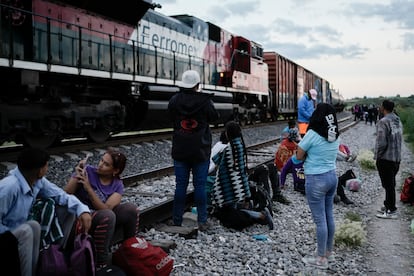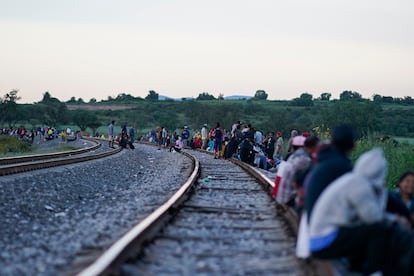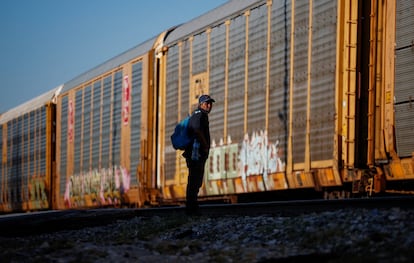Mexican railway operator’s decision to halt trains reveals ravages of migration crisis
Grupo México agreed to restore some freight services following a government offer to deploy more security officers, but the dangers of the journey to the border with the United States were left unaddressed

Venezuelans who have crossed the deadly Darién jungle say that they are clear about the worst part of the journey to the United States: Mexico. Crossing the country is a nightmare for hundreds of thousands of migrants who face corruption by authorities and violence by cartels until they reach the northern border. There are more than 3,000 kilometers between Tapachula and Ciudad Juárez, one of the last stops before the leap to the North American dream. Some migrants, those who have obtained a circulation permit and have the money for it, travel part of the journey by bus. The rest of them walk, run, or ride The Beast. Freight trains have become, despite their danger, an effective way to cross the country. This week, the railway operator Grupo México announced that it was halting more than 60 trains to prevent migrants from getting on, in a wake-up call to the government, which continues to look the other way in this migrant crisis.
It was an unprecedented decision. Ferromex, the company owned by the billionaire Germán Larrea, the second-wealthiest man in Mexico, decided on Tuesday to suspend train runs for 60 freight trains due to the agglomeration of more than 4,000 migrants willing to risk their lives to climb aboard. The company said there were about 1,500 people waiting at a rail yard in the city of Torreon, in the northern border state of Coahuila. The company also reported about 800 migrants waiting at the freight yards in Irapuato, in the north-central state of Guanajuato, with another 1,000 reported in San Francisco de los Romo (Aguascalientes), and more than 1,000 in Ciudad Juárez (Chihuahua).

“Given the notable increase in migrants gathered in various regions of the country and the severe risk that the use of freight trains for transportation represents to their physical safety, Ferromex has temporarily stopped 60 trains, equivalent to the cargo capacity of 1,800 tractor-trailers, on routes to the north of the country, in the regions impacted by this social and humanitarian problem,” the company said in a statement. The decision came after two people were killed and four others injured in recent days. Freight trains have been leaving a trail of deaths and mutilations in Mexico for years. The consequences of the measure were not long coming, and some analysts estimated the daily losses for the company at 40 million pesos ($2.3 million).
Given the urgency of the situation, the National Migration Institute (Inami) has proposed posting more federal immigration agents on the train routes and, at the same time, asked Ferromex to increase its own private security personnel traveling with the crew.” The Inami estimated that around 3,000 people boarded freight trains irregularly with the goal of reaching the northern border of Mexico during September alone. Late on Wednesday, Ferromex announced that following talks with the government it would restore “railway traffic only on routes where there are no high-risk conditions,” but it did not specify which ones or how many.

Many human rights organizations reacted to the decision to halt trains. The Documentation Network of Migrant Defense Organizations (REDODEM) pointed out in a statement: “Instead of being a protective measure, it will exacerbate other risks, and may even generate new problems for the safety of people in the context of human mobility. Suspending the operation of train routes is not a solution.” The humanitarian organization stated that “migrants travel by train, with all the associated risks, because the Mexican authorities leave them no other option.”
“Even bus terminals have been closed, as happened recently in Arriaga, Chiapas,” noted REDODEM. “And in collusion with authorities and criminal groups, there are checkpoints along the routes where people are taken off the bus, extorted, and in some cases immigration authorities tear up their humanitarian visas and other identification documents, arrest them and take them to immigration stations.”
Mexico has a dark history of migrant massacres, from the 72 who were killed in San Fernando, Tamaulipas in 2017, to the 19 migrants shot and burned in Camargo in 2021. More recently, in March, a fire at an immigration detention center killed 40 migrants because no one opened the gates to the block where they were locked up.
Sign up for our weekly newsletter to get more English-language news coverage from EL PAÍS USA Edition
Tu suscripción se está usando en otro dispositivo
¿Quieres añadir otro usuario a tu suscripción?
Si continúas leyendo en este dispositivo, no se podrá leer en el otro.
FlechaTu suscripción se está usando en otro dispositivo y solo puedes acceder a EL PAÍS desde un dispositivo a la vez.
Si quieres compartir tu cuenta, cambia tu suscripción a la modalidad Premium, así podrás añadir otro usuario. Cada uno accederá con su propia cuenta de email, lo que os permitirá personalizar vuestra experiencia en EL PAÍS.
¿Tienes una suscripción de empresa? Accede aquí para contratar más cuentas.
En el caso de no saber quién está usando tu cuenta, te recomendamos cambiar tu contraseña aquí.
Si decides continuar compartiendo tu cuenta, este mensaje se mostrará en tu dispositivo y en el de la otra persona que está usando tu cuenta de forma indefinida, afectando a tu experiencia de lectura. Puedes consultar aquí los términos y condiciones de la suscripción digital.









































